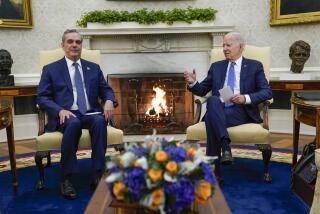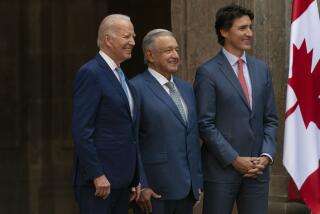$2.9 Billion for Investments, Not Interest Payments : World Bank to Offer Loans to Latin America
WASHINGTON — In an effort to help debt-ridden Latin American nations, the World Bank plans to provide $2.9 billion in economic development loans before the end of June, including $1.1 billion for Mexico, a spokesman said Tuesday.
The bank wants to help stimulate industrial activity among the debtor nations and, by its example, to encourage commercial banks to resume providing funds. The money will be invested in local business activities rather than being used to repay the massive debts.
“Our interest is to see that growth is resumed,” said Peter Riddleberger, a spokesman for the bank, an international lending organization supported by member governments.
“Countries shouldn’t depend on one commodity; they should diversify their economies,” he said. By creating jobs and building their own economies, the debtor countries eventually should be able to generate money to repay foreign loans, World Bank officials say.
The biggest loan package will go to Mexico, struggling to recover from last year’s huge earthquake while suffering from the precipitous drop in the price of oil, which provides two-thirds of the nation’s export revenue.
The bank’s board of directors Tuesday approved four loans for Mexico: $400 million in emergency earthquake reconstruction funds, $150 million for industrial recovery, $40 million for municipal development and $25 million for a sewer project.
More Loans Planned
In April, the board will consider another loan of $500 million for Mexico. In return, Mexico is being urged to encourage the development of export industries and to ease its restrictions on investments by foreigners in its businesses.
Latin American nations are burdened with $380 billion in foreign debts. The biggest debtors are Brazil, with debts of $99 billion; Mexico, with debts of $97 billion, and Argentina, with debts of $48 billion.
Striving to repay the money, many of the nations have adopted strict austerity programs, cutting government benefit programs and curbing imports. The austerity measures frequently result in a reduced standard of living.
The policies also affect U.S. workers because the Latin American nations reduce their purchases of U.S.-made goods.
Meanwhile, U.S. banks, worried about the ability of the debtor nations to repay the loans, are reluctant to furnish additional funds. But the Latin American nations need money to develop their economies, thus raising their standards of living, and to repay the loans. Treasury Secretary James A. Baker III has called for additional lending to the debtor countries, but the banking community has been slow to respond.
“We are beginning our side of the effort to expand lending,” Riddleberger said of the World Bank’s plans. “For those areas requiring austerity, we are willing to provide . . . money so they don’t break their belts as they try to tighten them.”
The World Bank wants to prevent the potential collapse of local economies as governments strive to cut imports and curb consumption in an effort to repay loans, he indicated.
The bank will help identify attractive investment opportunities for foreign funds in these countries. “We want to provide a climate of comfort for the resumption of commercial bank lending, which has almost dried up,” Riddleberger said.
$176 Million to Colombia
In addition to the Mexican loans, the World Bank directors Tuesday approved $176 million in loans to Colombia for irrigation and rural transportation.
Other proposed loans scheduled for final approval by the end of June include $350 million to Argentina for agricultural development, $250 million to Colombia for agriculture, $310 million to Brazil for agriculture, $171 million to Brazil for rural development and $145 million to Ecuador for industrial finance and small business development.
More to Read
Sign up for Essential California
The most important California stories and recommendations in your inbox every morning.
You may occasionally receive promotional content from the Los Angeles Times.










